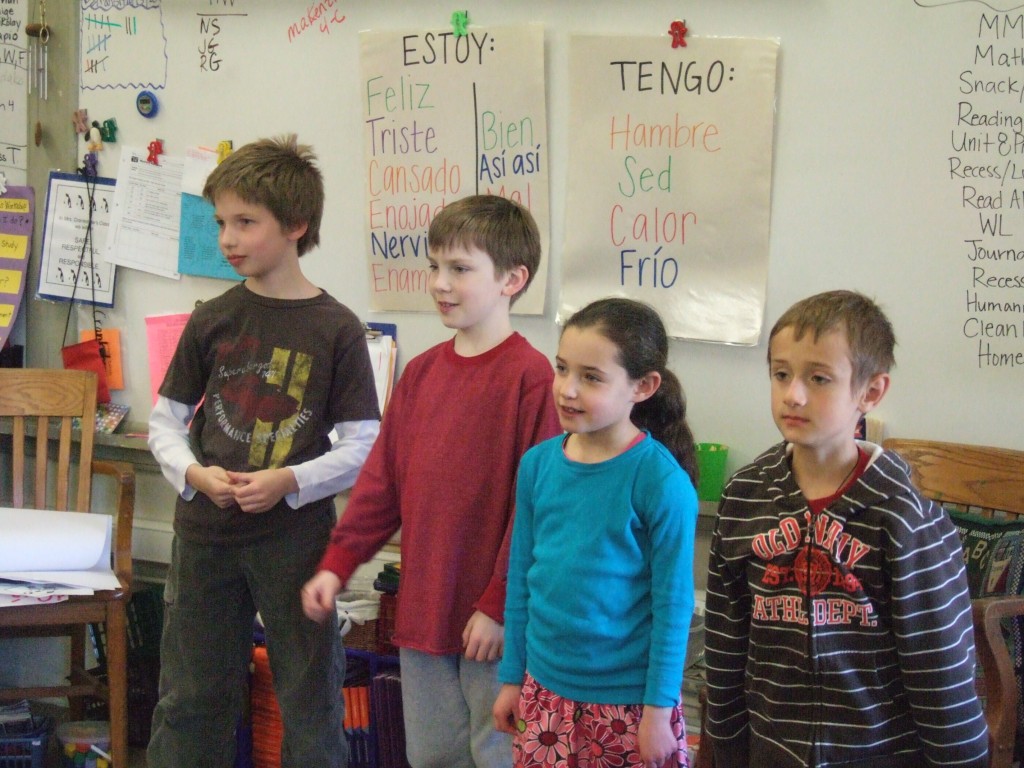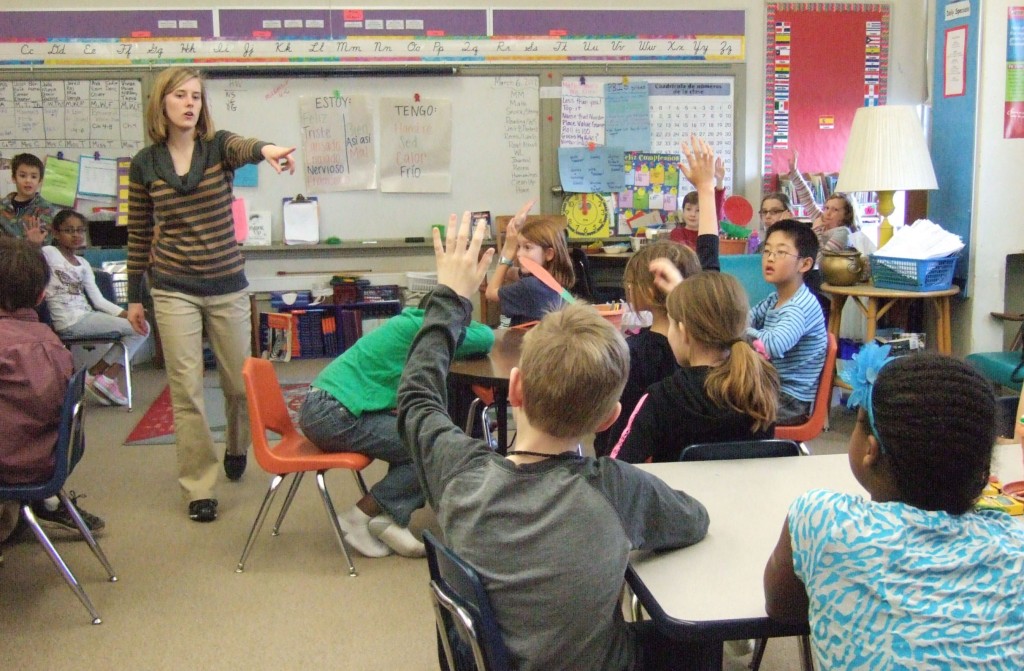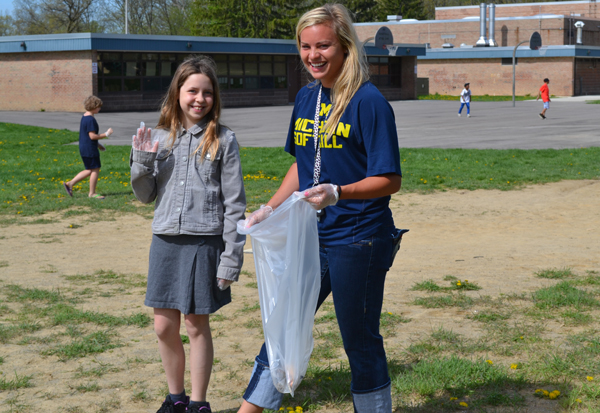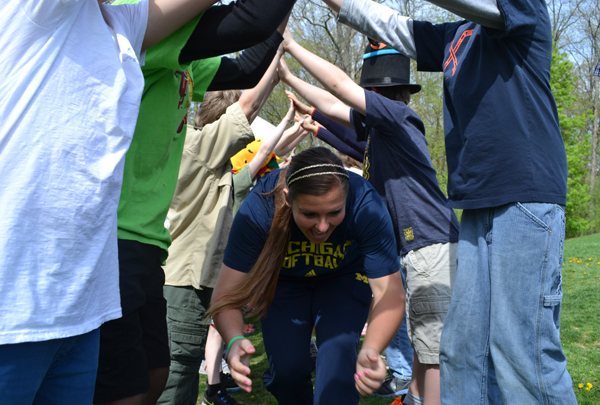
By Tara Cavanaugh
Twice a week, third and fourth grade classrooms at AAPS elementary schools make a transformation that changes everything: no English is allowed. Only Spanish.
The transformation is part of an educational partnership between AAPS and the University of Michigan. U-M students step into AAPS classrooms and give a 30 minute, Spanish-only lesson. The goal of the immersion lesson, called the Ann Arbor Language Partnership (or A2LP for short), is to give students a foundation for learning language skills.
“It’s kind of the same as introducing a musical instrument in fifth grade,” said Laura Delgado, a third grade teacher at Angell Elementary. “It’s more fun, social, and they’re more willing to try new things.”
Because the lesson is so short, much of it is done through kinesthetic activities. “The kids will stand up and do ‘The Macarena’ to learn the months of the year,” Delgado said. “It’s very movement-oriented and it touches multiple intelligences. They really try hard to engage all the learners. There’s a lot of calling and repeating.”
Delgado has been a mentor teacher for 3 years, as long as the program has existed. Mentor teachers host the U-M students who step in to teach the Spanish lessons.
“On our side, the U side, this is a course driven experience for them,” said Maria Coolican, the teacher education director of the program. “They sign up for this course, they get credit for it, they learn how to do this. On the AAPS side, they get world languages at a cost that makes it feasible.” She added that the AAPS Educational Foundation offers some funding assistance.
Most of the U-M students are Spanish students or native speakers, not education majors. They receive 4-6 weeks of training before teaching the elementary students, and they also meet weekly in a three hour seminar.
“Sometimes when (the U-M students) get there in the beginning they’re really nervous,” Delgado said. “It really does vary from teacher to teacher. You just have to get in here and try things and see what works and what doesn’t work.” The mentor teachers and Coolican help the students with lesson plans and classroom management.
The A2LP program is starting to expand. This is the first year it is taking place in fifth grade classrooms. The immersion lesson is still 30 minutes, but this time it’s taught by a certified language teacher.
“I’m pretty impressed with how much they’re able to understand and how much they retain from third and fourth grade,” said Ali Krauss, a world languages teacher who gives lessons to fifth grade classrooms in Allen, Pittsfield and Burns Park elementary schools.
Traditionally in many school districts, students don’t start learning a language until high school. “I’ve taught high school in the past, and it seems at that point a lot of kids can be burnt out or they see it as a requirement,” Krauss said. “But at (the elementary) age they’re still really excited about it. They almost don’t realize that they’re learning, they’re having so much fun.”
Krauss is excited to see A2LP expand, because it is affecting sixth grade Spanish curriculum too. Middle school used to be the first place that students approached Spanish, but now that they’ve been exposed to it since the third grade, sixth grade Spanish curriculum needs to make some adjustments, Coolican said. AAPS sixth grade teachers met earlier this winter to make some changes.
That’s one unexpected benefit from the A2LP program. The other is on the university side, where it’s become a recruiting tool for the education school. “Some student teachers who apply for this program decide they really like it, and apply for the school of education to become teachers,” Coolican said.
Turns out, a quick immersion lesson can not only spark the love of language, but the teaching passion too.

Related stories




A nice start, but too little too late. We have known that early language immersion is the way to teach languages sincs at least the 1960s. My Middle School and High School French classes were complete immersion classes in the Grosse Pointe Public School System–and they met 50 minutes a day, 5 days a week. I was virtually fluent by the the I got to college French–speaking, understanding, reading literature and poety, writing literature papers in French. This is not remarkable–it is a no brainer. Almost 40 years after High School I can still speak and understand French. If we are serious about language education kids should daily immersion, starting as early as possible for a develo-mentally appropriate amount of time. Preferably in preschool.
My now-7th grader had four years of part-time Spanish at Burns Park – and then went into the abyss of little-to-no-language ed in middle school. But he is still interested in taking a language and has retained much of that early education, which is better than nothing at all. I agree that early immersion would be ideal, but it far from being an option for us at this time with school budgets and curricula already full. It would take a real champion from within the AAPS to take this on, and it would be a great offering.